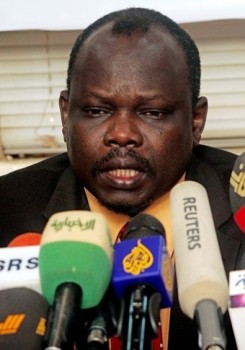Failure to conduct referendum in the South is ‘very dangerous’ – Amum
By James Gatdet Dak
August 27, 2009 (JUBA) – The Secretary General of the ruling political party in Southern Sudan has warned, for the second time in two weeks, that failure to enact a law for the expected 2011 referendum in the South would lead the nation to a “very dangerous” stage.

Amum accused the NCP of continuing to drag its feet on the process of enacting the referendum law and warned of a very dangerous consequence.
“If the law [for referendum] is not enacted by the end of the year, it will set the country for a very dangerous stage,” he cautioned.
This warning followed his earlier statement that the people of Southern Sudan would be forced to unilaterally declare independence if the referendum law is not enacted.
The statement angered NCP officials who reacted in a counter-warning that the unilateral declaration by the South would amount to a new rebellion on the Constitution.
However, in a press briefing following the end of the recently conducted SPLM Political Bureau meeting in Juba, Amum said the party agreed to be prudent and rational in its relations with the National Congress Party until the run of 2011 referendum on Southern Sudan self-determination.
He also added that the row over the referendum bill should be settled before the end of the first half of September [this year].
The Vice President of the Government of Southern Sudan and Chairperson of the party’s debating team on CPA implementation, Dr. Riek Machar, returned to Juba from Khartoum on Thursday without reaching any agreement with his counter-part, Ali Osman Mohamed Taha, on the main contentious issues on the referendum bill.
Among these contentious issues include the needed percentage of the votes cast in the South to declare the results in favor of separation and the qualification of who should vote in the referendum.
Michael Makuei Lueth, minister for Legal Affairs and Constitutional Development in the semi-autonomous government and legal advisor to the SPLM debating team, also explained earlier that the NCP presented a contradictory position on the proposed percentage.
Makuei said the NCP wants a 75% (2/3) vote in favor of declaring results for separation but a simple majority vote of 50+1% (slightly over 1/2) votes cast to favor unity, which he described as a “funny argument.”
The SPLM, he said, proposed a simple majority percentage for both choices and rejected the inconsistency of the NCP’s position on votes favoring either unity or secession.
Makuei also added that in another contentious issue the NCP also wants Southern Sudanese outside the territory of Southern Sudan to participate in the referendum.
The SPLM rejected this position, saying only the people of Southern Sudan residing inside the region during the referendum should qualify to vote.
The SPLM rejected the participation of Southerners residing outside the region on the ground that this could be a trick by the NCP to rig the results of the referendum votes in the name of Southerners in the North and abroad.
Khartoum, the national capital, is also agreed as the seat of the would-be formed Southern Sudan Referendum Commission, the body that shall oversee the referendum exercise, as stipulated in the Comprehensive Peace Agreement (CPA).
NCP rejected the SPLM’s argument to seat the Commission in Juba, saying it would be a violation of the 2005’s CPA.
The CPA has already provided for the Southern Sudan Referendum Commission to be based in Khartoum.
Amum also accused the NCP of destabilizing Southern Sudan by arming tribes in the region.
“Government of Southern Sudan is attacked by circles including the NCP, destabilizing it by arming tribes,” he said.
He called on the NCP to make unity attractive and if not, he added, the people of Southern Sudan will vote for separation by January 2011.
(ST)
